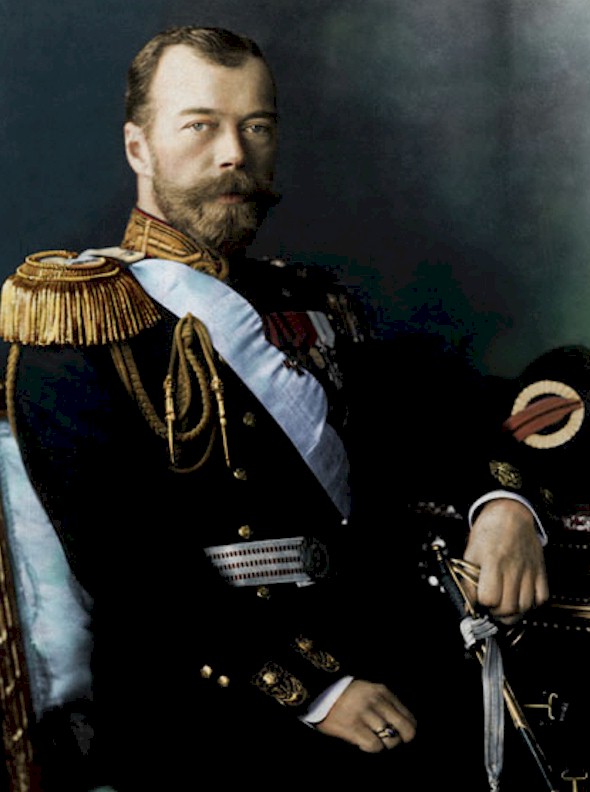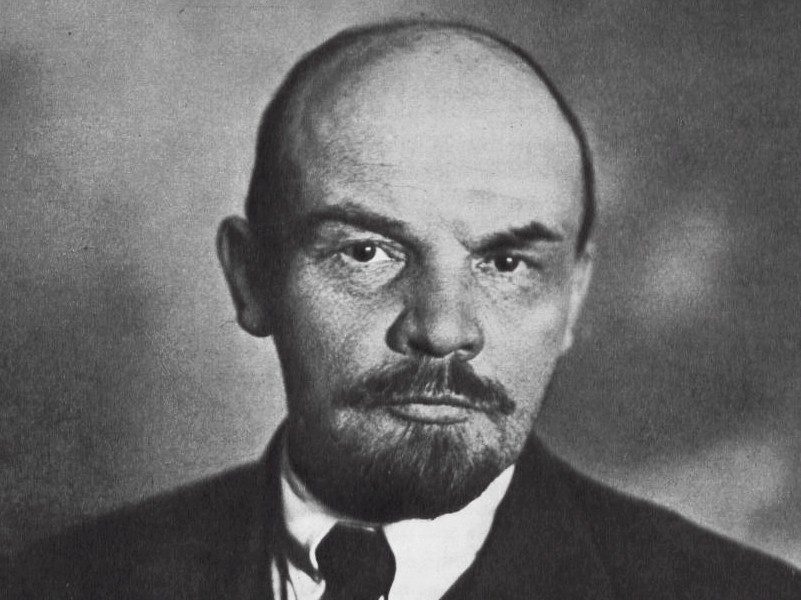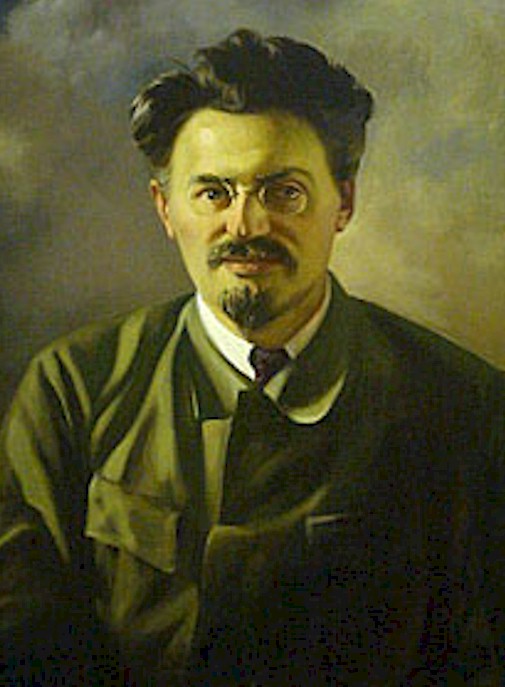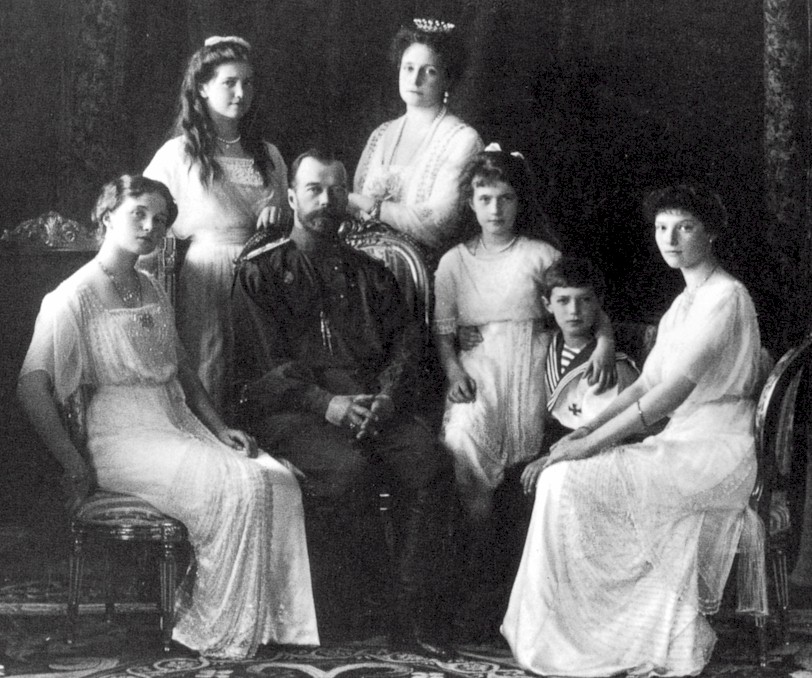Мы продолжаем напряженно работать, чтобы улучшить наш сайт и перевести его на другие языки. Русская версия этой страницы еще не совсем готова. Поэтому мы представляем здесь пока английскую версию. Мы благодарим вас за понимание.
Красные и белые
Introduction
At the end of the 19th century, when the industrialisation had caused a profound transformation of society in western Europe, 90% of the Russian population was still rural. So no-one had expected that the first socialist revolution would be realized in Russia, of all countries. Most marxists had expected the first assumption of power to be held in a developed capitalist country, such as Germany or England. In Russia, the serfdom was formally abolished in 1861, but almost nothing had changed in real life. The difference between the rich and the poor was huge. The protest movement against czar Nicolas II (1868-1918) increased.

Czar Nicholas II
1903
Since its origin in 1898, the Social-Democratic Labour Party was forbidden in Russia, so the first activities were deployed from abroad. In August 1903, the second Congress of the Russian Social-Democratic Labour Party was held in London. It started on July 30 in Brussels but it had to move to London after a police intervention. At this Congress, a voting had to be held on the composition of the editorial staff of the party newspaper Искра [Iskra] or The Spark. The voting produced a majority for the group around Vladimir Ilyitch Ulyanov (1870 - 1924), better known as Vladimir Lenin. The members of this group started to call themselves bolsheviks - coming from больше [bolshe] which means «more». The others were called the mensheviks - coming from меньше [menshe], which means «less». The mensheviks were headed by Yuli Osipovich Zederbaum (1873-1923), better known as Julius Martov. Bolsheviks and mensheviks became opposed to each other. The bolsheviks became the revolutionary wing of the party. They wanted to undermine and remove the state machinery through a revolution. The mensheviks were prepared to co-operate temporarily with liberal and social groups to start reformations. Later on, starting the 20's, the bolsheviks would adopt the name of Communist Party of the Soviet Union.

Vladimir Ilyitch Ulyanov (Lenin)
1904
During the Russian-Japanese war, Japan defeats the Russian army time after time. The people start muttering. In December, a wave of strikes start in Saint-Petersburg.
1905
On January 9, some citizens tried to hand over a petition to czar Nicolas II. The demonstration was put down by armed force and is known today as Bloody Sunday. In May, the Russian fleet in the Baltic Sea was sent to the bottom by the Japanese. In October, czar Nicolas II was forced to sign the October Manifest. It abolished autocracy and turned Russia into a constitutional monarchy. The first Duma (representation of the people) was elected.
In Saint-Petersburg, the first совет [soviet] or council of labourers was created in order to organise properly the first general strike of that moment. Other cities followed this example soon. Initially, the concept of soviets was connected with local councils of labourers, paisants and soldiers.
1914
Russia gets involved in World War I at the Eastern front, which extended from the Baltic Sea to the Black Sea. The troops of the czar weren't in the same league of the coalition of Germany, Austria, Prussia and Hungary. To Lenin it was clear from the beginning that Russia was heading for a defeat. In August, the name of the capital Saint-Petersburg was changed into Petrograd.
1915
The czar dismisses his generals and assumes command on the army and the fleet himself.
1916
The situation at the front becomes gradually unbearable. The threatening of food riots becomes real.
1917
On the International Women's Day, thousands of women demonstrate for more food. The striking labourers of the Putilov metallurgical and machine-building factory join them. On the next day, more demonstrations take place on which slogans are exclaimed as «Stop the war» and «Stop autocracy». On Februari 25, a general strike breaks loose in Petrograd. In contrast with the 1905 revolution, the soldiers refuse to shoot at the crowd this time.
On February 26, czar Nicolas II decides to dissolve the Duma. But the representatives put aside the czar's orders and they form the Provisional Committee. The Provisional Committee is soon renamed the Provisional Government, initially headed by prince Georgi Yevgenevich Lvov (1861-1925), but in July taken over by Alexander Fyodorovich Kerensky (1881-1970), a menshevik of the Petrograd soviet, of which the bolshevik Lev Davidovich Bronstein (1879-1940), better known as Leon Trostky, was the chairman. The incapacity of the Provisional Government to end World War I caused the loss of influence of the mensheviks in favour of the bolsheviks. The Provisional Government and the Petrograd soviet will start fighting to each other for the power of government.

Lev Davidovich Bronstein (Trotsky)
On March 2, czar Nicolas II announces his resignation. The Petrograd soviet issues Command no. 1 by which all political acitivities of the army are henceforth subject to control of the soviet. The next day, the czar's brother refuses to accept the crown. Lenin returns to Petrograd from Switzerland. Josef Vissarionovich Dzhugashvili (1878-1953), better known as Joseph Stalin returns from Siberia.

Josef Vissarionovich Dzhugashvili (Stalin)
With a dummy cartridge from the cruiser Aurora, the take-over of the bolsheviks starts on October 25 - or November 7 according to the gregorian calendar. The Winter Palace in Petrograd is attacked, after Trostky's military revolutionary committee had occupied all strategic places in the city. Pamphlets were spread all over the city announcing the fall of the Provisional Government. In December, the secret police Cheka is created under command of Felix Edmundovich Dzerzhinsky (1877-1926).
Between 1917 and 1920, Russia has known a heavy struggle between the bolsheviks - the Reds - and the troops of the former czar regime - the Whites. The origin of the term Whites is not very clear. There was probably a connection with the royal standard of the French Bourbons, which was white. In the nineteenth-century France the name of the Whites was used for the ultra royalists. Very diverse groups as the liberals, moderated socialists, monarchists, mensheviks, cossacks and dyed-in-the-wool conservatives were part of the Whites. They were bound by their aversion to bolshevism and they were led by czarist generals. One of the last bastions of the Whites was the seaport Odessa, at the Black Sea, until the soviets arrived there too. Thousands of fugitives ran to the last steamers that were waiting there.
In his novel The White Guard and its theatre adaptation The Days of the Turbins, Mikhail Bulgakov described the fate of the Turbin family, living in Kiev while the various armies of the Russian Civil War - the Whites, the Reds, the Imperial German Army, and Ukrainian nationalists - fight over the city.
1918
During the civil war between the Reds and the Whites, czar Nicolas II was killed on July 16, together with his entire family, the chef, the doctor, the gentlewoman and the tutor. Following a stubborn legend, the youngest daughter, Anastasia, would have survived the massacre.

The Russian royal family
In March, Lenin moves the government from Petrograd to Moscow, which becomes the new capital of the Soviet Union.
1919
On March 4, 1919, the Third Communist International or Comintern was founded. Grigoriy Yevseevich Zinoviev (1883-1936) was the first chairman.
The civil war was a very cruel one - on both sides. The Whites killed 100.000 Jews in organised pogroms. General Pyotr Nikolayevich Wrangel (1878-1928) executed Red officers to persuade their soldiers to join his army, while general Aleksandr Vasiliyevich Kolchak (1874-1920) in Omsk massacred a complete Red army. White cossacks dragged Red prisoners over the ground with lasso's, and they cooked guerrilla fighters in the kettles of locomotive engines. The reds had little to learn from them, they massacred complete villages. Priests were speared on poles, and on the bodies of White officers were tied cages with rats, the cages were then heated so that the rats gnawed their way through the bodies.

Aleksandr Vasiliyevich Kolchak
The real victims were, of course, the citizens. Red and White terror cost millions of lives. Famine and diseases broke out. And, as if the civilians had not enough to fear from the Whites and the Reds, they had to be on alert for each other too: plunderings, killings, robberies and even cannibalism were reported. Between 1918 and 1923, the civil war cost about 15 million of Russians their lives.
1920
The end of the civil war is near. In spite of the support of the Americans, British, French and Japanese, the Whites were so divided that they could no longer offer resistance against Trostky's Red Army.
1921
In March, the sailors of Kronstadt revolt against the lack of democracy and the dictatorship of the bolsheviks. The rebellion was put down hard-handedly. Lenin proclames the New Economic Policy (NEP). With this, he drops the rigid war communism of the years before, because it had appeared to be disastrous for both agriculture and industry. Russia is starving.
Under the NEP, farmers were allowed again to have their own little business. They could put their remains on the market - after having paid a reasonable amount of taxes. Private persons got more opportunities in trade and light industry too. But the heavy industry, the banking sector, transportion and foreign trade (which doesn't amount to almost anything anymore), are still state business.
The NEP is a success. Linear communists are of the opinion that the NEP deviates from true communism and they see to their dissatisfaction how farmers become small entrepreneurs. When, later, Stalin will take power, he will finish the NEP quickly and introduce his first five-year plan with a strongly controlled collectivizing.
1922
Stalin becomes Secretary-General of the communist party on April 3. Two weeks later - on April 16 - Germany and communist Russia conclude the Treaty of Rapallo. Under this treaty between the German Weimar Republic and Bolshevik Russia, each renounced all territorial and financial claims against the other. On December 25, Lenin makes his will. On December 30, the Union of Socialist Soviet Republics or USSR is created.
In his will Lenin writes: «Comrade Stalin, having become Secretary-General, has unlimited authority concentrated in his hands, and I am not sure whether he will always be capable of using that authority with sufficient caution. Comrade Trotsky, on the other hand, as his struggles against the Central Committee on the question of the People's Commissariat for Communications has already proved, is distinguished not only by outstanding ability. He is personally perhaps the most capable man in the present Central Committee, but he has displayed excessive self-assurance and shown excessive preoccupation with the purely administrative side of the work. These two qualities of the two outstanding leaders of the present Central Committee can inadvertently lead to a split, and if our Party does not take steps to avert this, the split may come unexpectedly.»
1923
In an epilogue to his will Lenin writes more which isn't very flattering for Stalin. «Stalin is too rude and this defect, although quite tolerable in our midst and in dealing among us Communists, becomes intolerable in a Secretary-General. That is why I suggest the comrades think about a way of removing Stalin from that post and appointing another man in his stead who in all other respects differs from Comrade Stalin in having only one advantage, namely, that of being more tolerant, more loyal, more polite, and more considerate to the comrades, less capricious, etc...».
After Lenin's death, Sovnarkom and Politburo chairman Lev Borisovich Kamenev (1883-1936), Comintern chairman Grigoriy Yevseevich Zinoviev (1883-1936) and Secretary-general Joseph Stalin (1878-1953) can prevent the announcement of Lenin's will and the discussions about it within the party. Only after Stalin's death it becomes public and appears how much Lenin was right in his judgment on Stalin...